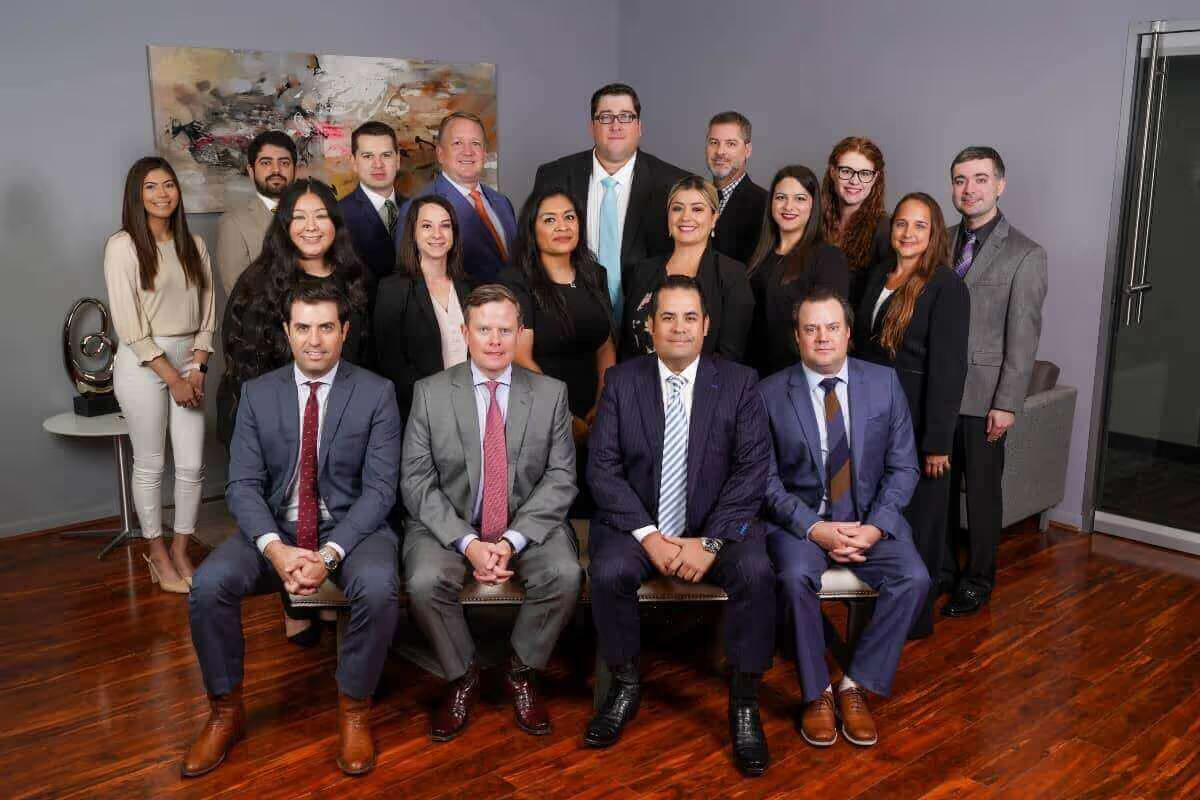Can You Sue a Nursing Home for a Fall?
Hiring a lawyer is the first step towards recovering a better quality of life. At Osborne & Francis, we devote our undivided attention to each client, and all communications are held in the strictest privacy. Contact us by filling out the form or calling us directly at (561) 293-2600.
By Pierce | Skrabanek
Published on:
July 12, 2024
Updated on:
July 22, 2025

.avif)
.avif)


Falls in nursing homes are a serious concern, often leading to severe injuries or even death among residents. For families and loved ones, the aftermath of such incidents can be devastating, leaving them with questions about the care their relatives receive and legal options for seeking justice.
A nursing home abuse lawyer at Pierce Skrabanek can address whether you can sue a nursing home for a fall, the legal grounds for such lawsuits, and what steps you should take if you find yourself in this unfortunate situation.
Our team has won numerous multimillion-dollar verdicts and settlements for clients across the nation, including for our elders and their loved ones. We fight to ensure the older generation is given the respect and dignity they deserve.
If your loved one has suffered a fall, don't hesitate to reach out to us online or at (832) 690-7000 for a free, confidential consultation regarding a nursing home fall lawsuit.
Understanding the Risks and Why Falls Happen in Nursing Homes
Falls are alarmingly common in nursing homes. According to the Centers for Disease Control and Prevention (CDC), approximately 2,125 older adults living in Texas nursing homes died from fall-related injuries in 2021.
Many more suffer from non-fatal injuries that lead to reduced quality of life and increased disability. Various factors are responsible for the high incidence of falls in nursing homes:
- Age-related decline, such as decreased muscle strength, balance problems, and vision impairment.
- Physical health conditions, such as Parkinson’s disease, osteoporosis, and arthritis.
- Cognitive impairments, like dementia and other cognitive disorders.
- Medications that can cause dizziness or drowsiness.
- Environmental hazards, like poor lighting, uneven flooring, loose rugs, and cluttered walkways.
- Inadequate staffing levels and insufficient training.
- Failure to develop or implement individualized care plans.
Legal Grounds for Suing a Nursing Home for a Fall
If a fall occurs in a nursing home, it is crucial to determine whether the facility or its staff were negligent. Negligence in nursing homes can take many forms, such as:
- Failure to provide adequate supervision.
- Inadequate training.
- Environmental hazards.
- Improper use of restraints.
- Medication errors.
Elements of a Negligence Lawsuit
Nursing homes have a legal duty to provide residents with a safe living environment. This duty extends to taking reasonable steps to prevent falls. To successfully sue a nursing home for negligence, you must prove four key elements:
- Duty of care: The nursing home was legally obligated to provide a certain standard of care to residents.
- Breach of duty: The nursing home or its staff failed to meet the required standard of care.
- Causation: The breach of duty directly caused the fall and subsequent injuries.
- Damages: The resident suffered actual harm or injury due to the fall.
If a fall occurs in a nursing home and you believe the nursing home failed to meet its duty of care, you may have grounds for a lawsuit.
At Pierce Skrabanek, we take elder abuse claims very seriously, as these are supposed to be your loved one's golden years. Contact us online or call (832) 690-7000 so we can review your claim and determine whether you can sue the nursing home for negligence.
Gathering Evidence to Support a Texas Nursing Home Abuse Claim
Proving negligence in a nursing home fall lawsuit requires substantial evidence. Here are some crucial steps our nursing home abuse lawyers can help you take:
- Medical records: Obtain detailed medical records documenting the resident’s condition before and after the fall. These records can help establish the extent of the injuries and any prior conditions that might have contributed to the fall.
- Incident reports: Nursing homes are required to document all incidents, including falls. Request a copy of the incident report, which should provide details about the circumstances of the fall.
- Witness statements: Gather statements from staff, other residents, or visitors who witnessed the fall or have knowledge of the conditions that led to it.
- Facility records: Obtain records related to staffing levels, staff training, and premises maintenance. These documents can help demonstrate systemic issues that may have contributed to the fall.
- Expert testimony: Engage medical and nursing home care experts who can testify about the proper standard of care and how the nursing home’s actions fell short.
Are Nursing Homes Liable for Falls?
The legal process of suing a nursing home for a fall or other form of elder abuse can be complex. Here is a general overview of the steps involved in suing a nursing home:
- Consultation with a nursing home fall attorney: Speak with a lawyer who specializes in nursing home negligence cases. We can evaluate the strength of your case, advise you on the legal options available, and guide you through the legal process.
- Investigation: We will thoroughly investigate, gather evidence, and consult with experts to build a strong case.
- Demand letter: We may send a demand letter to the nursing home outlining the claim and seeking compensation for your loved one’s damages.
- Filing a complaint: If we believe you have a valid claim and the nursing home does not adequately respond to our demand for compensation, we will file a complaint in the appropriate Texas court. The complaint outlines your allegations and the damages you are seeking.
- Discovery: Both sides will exchange information and evidence through discovery. This may involve depositions, interrogatories, and requests for documents.
- Negotiation and settlement: Many cases are resolved through settlement negotiations. Our skilled attorneys will work to achieve a fair settlement that compensates you for the injuries and losses suffered.
- Trial: If we cannot reach a satisfactory settlement, the case will proceed to trial. We will present your case, and a judge or jury will determine whether the nursing home was negligent and what damages should be awarded.
What Types of Damages Can You Sue a Nursing Home For a Fall For?
If you successfully prove the nursing home or its staff acted negligently, you may be entitled to various types of damages, including:
- Medical expenses: Compensation for medical bills related to the fall, including hospital stays, surgeries, medications, and rehabilitation.
- Pain and suffering: Compensation for physical pain and emotional distress caused by the fall and resulting injuries.
- Loss of enjoyment of life: Compensation for the impact of the injuries on the resident’s quality of life and ability to engage in daily activities.
- Punitive damages: In cases of particularly egregious conduct, the court may award exemplary damages, often called punitive damages, to punish the nursing home and deter future negligence.
Our esteemed team of attorneys at Pierce Skrabanek will work diligently to recover maximum compensation on your behalf. Contact us today to learn how we can help you get justice for your loved one who suffered from a nursing home’s negligence.
How Long Do I Have to File a Claim?
The statute of limitations for personal injury cases, including nursing home negligence, is generally two years from the date of the injury.
Acting promptly to ensure your case is filed within this timeframe is crucial. However, exceptions or specific circumstances may affect the deadline, so consulting with an attorney as soon as possible is advisable.
Approximately 1 in 10 nursing home residents in the United States experience some form of abuse.
If you suspect your loved one is suffering any type of abuse in their nursing home, contact our team online or call (832) 690-7000. Your loved one’s safety and well-being are our top priorities.
Challenges in Suing a Nursing Home
Suing a Texas nursing home can be complex and challenging for several reasons:
- Corporate ownership: Many nursing homes are part of larger corporate entities with extensive legal resources. This can make litigation more challenging and time-consuming.
- Documentation and evidence: Nursing homes control much of the evidence needed to prove negligence, such as medical records and incident reports. Securing this evidence can be difficult without legal assistance.
- Defense tactics: Nursing homes and insurers often employ aggressive tactics to minimize liability and settlement amounts. Having an experienced attorney is crucial to countering these strategies.
- Emotional toll: The legal process can be emotionally draining, especially when dealing with the injury or loss of a loved one. It is important to have a strong support system and professional guidance.
Preventive Measures for Families
While it is not always possible to prevent falls and other types of nursing home abuse, families can take steps to reduce the risk and ensure their loved ones receive proper care:
- Research and choose wisely: Thoroughly research nursing homes before making a decision. Look for facilities with good reputations, high ratings, and positive reviews.
- Visit regularly: Frequent visits to your loved one can help you monitor their condition and the quality of care they receive. It also shows the nursing home staff that you are vigilant and involved.
- Communicate with staff: Establish open lines of communication with the nursing home staff. Discuss your loved one’s needs and concerns, and ensure they are addressed promptly.
- Safety assessments: Request regular assessments of your loved one’s living environment. Ensure necessary modifications and assistive devices are in place to reduce fall risks.
- Monitor health: Keep track of your loved one’s health conditions and medications. Ensure that medical professionals promptly address any changes in their condition.
- Report suspected abuse: If you suspect mistreatment of your loved one, report the abuse to the nursing home, an attorney, and the proper authorities immediately.
How to Sue a Nursing Home
Falls in nursing homes are a serious issue that can have devastating consequences for residents and their families. While it is possible to sue a nursing home for a fall, proving negligence requires substantial evidence and legal experience.
Contact Pierce Skrabanek for more legal support and help. Reach out for a free consultation online or call (832) 690-7000 to discuss your options and learn how we can support you in seeking the compensation and justice your loved one deserves.




